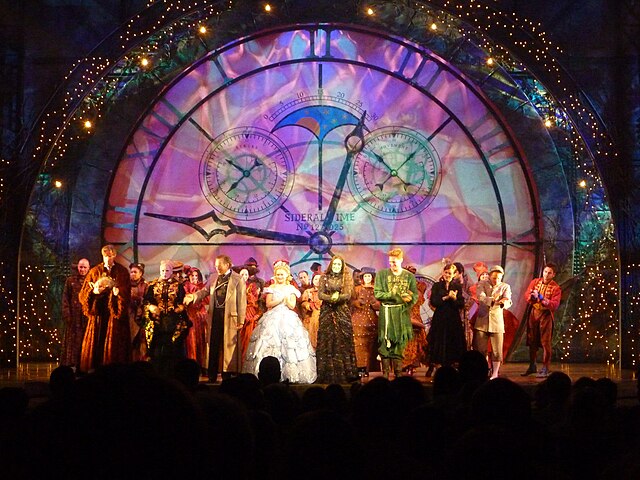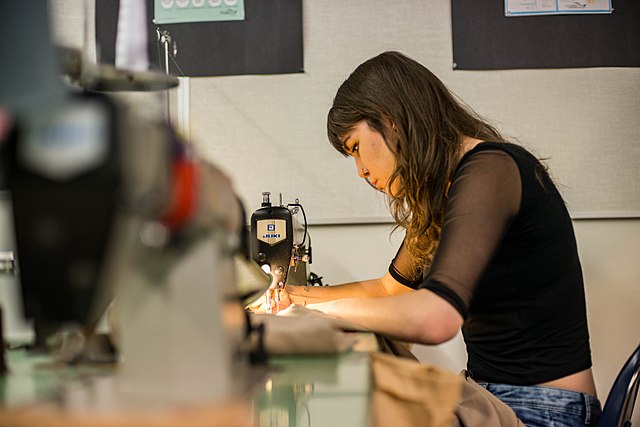What better way to welcome warm weather than with a production of Shakespeare’s seminal “A Midsummer Night’s Dream”? This year’s spring play will be anything but ordinary.
“This is the first time Guilford has done Shakespeare since I’ve been here,” said junior Puja Tolton in an email interview. “It’s a lot to tackle, especially since (David Hammond, director and professor of theatre studies) knows so much about it.”
The fairies, lovers and mechanicals — the different roles of actors within the play — all interact within the forest during the night, causing trouble until the sun rises.
“It’s been very fun, since my main action in the play within the play is to act ridiculous and get laughs from the other actors on stage and hopefully the audience also,” said sophomore Lucas Blanchard-Glueckert in an email interview. “I love the shtick (Hammond) has added into it.”
The play brims with talent, from first-years newly experiencing a Guilford play to seniors who will take their final bow here.
“There is a large range of experience in this show,” said Tolton. “It’s been really great working with students who are working on a college-level production for the first time because they bring a refreshing attitude and perspective. It’s thrilling to watch both their skills and their maturity grow.”
The main cast consists of a madcap bunch of characters who are both memorable and hilarious in their adventures on Midsummer’s Eve.
The main lovers of the play are Helena, played by Tolton; Demetrius, played by junior Richard Rogers; Hermia, played by sophomore Mary Heisey; and Lysander, played by first-year Ian Sweet.
“You end up with four strong forces running around the stage with their own senses of reality that conflict with each other’s, and that’s always a good time,” said Heisey in an email interview.
The fairies are another confused bunch, with King Oberon, Queen Titania and Robin Goodfellow — commonly known as Puck — played by juniors Gabe Pelly, Lizzie Fistel and Ivey Long, respectively.
“Playing a fairy is different than playing a lover or a mechanical because the circumstances of our lives are actually different,” said Fistel. “We’re immortal, we don’t have souls and we don’t have or necessarily understand human consciousness, but we are much more in touch with the spirit of the Earth and how we affect it.”
This play will be a fun and funny romp to be sure, but it took serious work and long hours to get everything ready.
“Rehearsals have been very difficult, but rewarding,” said Heisey. “I came into the production thinking I knew a thing or two about Shakespeare, but through the process I’ve realized I don’t know much.”
The performance contains an interesting commentary on acting based around a troupe of inept actors trying to put on the perfect play, making it the perfect comedic metaplay for Guilford to perform.
“Personally, the play within the play is my favorite part, and it’s what convinced me to audition in the first place,” said Blanchard-Glueckert.
The actors have been in rehearsal essentially every night for about four hours or more for months, working constantly and perfecting their characters. Many of the actors also have double roles, with Tolton also working as publicist, senior Jake Kresloff acting as a fairy and working as dramaturg and Blanchard-Glueckert acting and designing the set.
“If you’re wondering why you haven’t seen any of your friends who are involved in the theatre department these past few months, it’s because we’ve been working so hard on this,” said Fistel.
Not only have the actors been working hard, but this is also the most physical play that Guilford has had in a while. The actors are acting, running, screaming and doing gymnastics throughout the entire performance.
“I’ve had to do things physically that completely surprised me,” said Tolton. “(And) there are students who have to embody moths, lizards and cobwebs in a truthful way.”
“The humour and the physicality of the play has been taken to a level that will make it much easier to understand for students who are not big on Shakespeare already,” said Blanchard-Glueckert. “Because of that it can be enjoyed on many different levels by many different people.”












